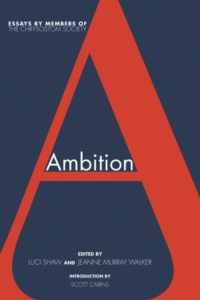
Ambition: Essays by Members of The Chrysostom Society
Edited by Luci Shaw and Jeanne Murray Walker. Ambition: Essays by Members of The Chrysostom Society. Eugene, Oregon: Cascade Books, 2015, 142 pp. $16.80.
Reviewed by Aaron Morrison
In On the Priesthood, St. John Chrysostom warned ambition corrodes Christian vocation, making it an apt topic for the Chrysostom Society to address in Ambition. Scott Carin’s intro defines ambition as “a powerful and continuing desire to accomplish… or become great things” (ix). He summarizes the main argument of these reflections to regard ambition as “an impulse that can lead either to greatness or ruin” (ix). The authors’ reflections are engaging to an audience of aspiring writers or academics and they speak prophetically to the erosion of the common good through ambition’s partnership with self-fulfillment.
In general, these nine essays can be loosely categorized around the authors’ tone towards ambition’s impact, which is positive, negative, or neutral. Under the first category, Erin McGraw relates the story of caring for her dying mother to discuss how the moral worth of ambition lies in its telos. Both Luci Shaw and Emile Griffin similarly follow McGraw’s argument. They analyze their struggles with literary accomplishment and recognition to challenge readers to ask who ambition serves and how its source informs our duties. These writers tend to view ambition itself in neutral terms and instead reserved ambition’s telos for moral judgment. The next group of writers strikes a more positive tone towards ambition. Dain Trafton integrates political philosophy and the Bible with a story of how his family socialized him to value the power of ambition for the common good. Diane Glancy expresses gratitude for the divine gift of ambition as a source of perseverance and a mirror to understand herself. The last group of authors writes of ambition with more cautionary terms. Eugene Peterson describes how ambition conjoined with busyness threatened his Christian witness. He writes of how turning to the wisdom of Wendell Berry among others helped him embrace humility and become a better minister. Jeanne Murray Walker addresses ambition in her struggle to gain respect as a female author and her lament over the unfair imposition of her ambition upon her children. Gina Ochsner writes of ambition’s insatiable demands and how the accomplishment of ambition almost always leads a person to desire more. In the last essay, Bret Lott tells of a more satisfied ambition when it becomes subordinate to gratitude.
The value of Ambition’s arguments lies in how well the authors describe the role ambition should play in a life well lived under God. Ambition does not sustain a single argument regarding ambition. However, some authors clearly outlined ambition’s role in the tensions between the “American Dream” of “fulfilling all our aspirations” (back cover) and the demands of Christian vocation.
Because Ambition calls for the authors’ personal reflections, its essays do not depend on outside research. However, when employed well, outside sources strengthen the authors’ narratives. Eugene Peterson’s reference to Wendell Berry and James Joyce represents perhaps the most effective example. He integrates his discovery of their writings as part of the process of redirecting his misdirected ambition. From Berry and Joyce, Peterson learns “man is only strong when he is conscious of his own weakness” (69).
When outside sources are used less effectively they distract from the author’s main personal narrative. Gina Oshner starts her essay with an engaging story about her ambition to be a marathon runner and a stunt motorcyclist. However, after going on to discuss the historic quest for the South Pole, her brief return to personal reflection at the end feels abrupt and lessens the intelligibility of her conclusion.
In terms of style and readability, all authors demonstrate their honed expertise. Sometimes they substitute unnecessary paradox for clarity or lose focus with too many rhetorical questions. But mostly, the writing is crisp, concise, and flows with ease. Of note concerning style is the distinctiveness of Brett Lott’s “Towards Humility.” Lott engages the reader in his perspective by narrating the reader’s experience. The change is jarring at first, but Lott’s skillful use of pathos explains his arguments effectively at the essay’s conclusion.
The authors admirably shape the contours of ambition as it is known in many corners of life – as aspiring writers, family members, explorers, athletes, etc. As they express the extent of ambition’s presence, the authors adequately expose the misuse of ambition, namely in the pursuit of fame, recognition, and achievement. These warnings ring true, yet only a few authors address ambition’s most dangerous form: its attractiveness to ego. Even the most well-intentioned Christian witness cannot easily escape the ambition of the ego for self-fulfillment. On this point, Eugene Peterson’s essay on busyness and Luci Shaw’s essay on Lent represents the most compelling articulations of ambition’s most threatening forms to the Church.
St. John Chrysostom took seriously the sacredness of Christian vocation, and he anticipated the subtleties of how human ambition could desecrate it. The members of the Chrysostom Society submit a similar rigorous treatment in Ambition. They give thanks to God for the gift of ambition in their lives while also being wary of its threat to Christian witness. Some authors do not go far enough in their critique of ambition’s most seductive qualities. But for those authors who do speak to it, they update Chrysostom’s concern for a current audience, adding new insights for Christian living in a society subservient to the sovereign narrative of self-fulfillment.
Aaron Morrison, MDiv Student, Princeton Theological Seminary
